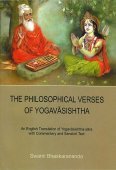Cessation: 1 definition
Introduction:
Cessation means something in Hinduism, Sanskrit. If you want to know the exact meaning, history, etymology or English translation of this term then check out the descriptions on this page. Add your comment or reference to a book if you want to contribute to this summary article.
In Hinduism
Yoga (school of philosophy)
Source: ORA: Amanaska (king of all yogas): A Critical Edition and Annotated Translation by Jason Birch1) Cessation can be denoted by the Sanskrit term Vināśa (as opposed to Utpatti—“arising”), according to the Amanaska Yoga treatise which deals absorption, yogic powers and liberation.—The Amanaska referred to (or qualified) Samādhi with several terms, which are all negative; [e.g., it is devoid of existence and non-existence, cessation and arising (vināśa-utpatti);] [...]
2) Cessation (in Sanskrit: Nirvāṇa) is intrinsically inherent in the mind, according to the Amanaska Yoga.—Accordingly, as Īśvara says to Vāmadeva: “[...] [Now], I shall define the nature of that highest, mind-free absorption which arises for those devoted to constant practice. [...] Just as the salty taste intrinsically inherent [in salt,] is effortlessly obtained from a salty substance, so gnosis of Brahma [in the form of] cessation (nirvāṇa) [which is intrinsically inherent in the mind] is effortlessly [obtained] from the mind. [...]”.
3) Cessation (of the mind’s activity) is denoted by the Sanskrit term Kṣaya, according to the Maitrāyaṇīyopaniṣat 6.34.1.—Accordingly: “Just as a fire without fuel is extinguished at its source, so the mind is extinguished at its source because of the cessation of its activity (vṛtti-kṣaya)”.
4) The Cessation (of the activities of mind) is also denoted by the Sanskrit term Nirodha, according to the Viṣṇudharma verse 96.25-26.—Accordingly, while discussing the cessation of mind: “Since [duality is based on mental activity and non-duality on the ultimate truth], the activities of mind, which are caused by meritorious and unmeritorious actions, should be stopped. Because of their cessation (nirodha), duality does not arise. This duality, which consists of whatever is moving and unmoving, is an object of mind. When the mind has become without thoughts, then one obtains the absence of duality”.
5) Cessation (of sleep) and Cessation (of thirst and hunger) refers to various signs and paranormal powers (siddhi) experienced by the Yoga practicioner, according to the Amanaska Yoga.—The last fifty-two verses of the Amanaska’s first chapter describe a temporal sequence of psychosomatic signs and paranormal powers (siddhi) brought about by absorption (laya). It begins with one moment, concludes with twenty-four years and consists of forty-seven intervals. [...] It informs practitioners of the initial experiences they may have while immersed in absorption [e.g., Cessation of sleep; Freedom from illness and cessation of thirst and hunger], and thus provides them with some idea of their progress in the practice, [...].

Yoga is originally considered a branch of Hindu philosophy (astika), but both ancient and modern Yoga combine the physical, mental and spiritual. Yoga teaches various physical techniques also known as āsanas (postures), used for various purposes (eg., meditation, contemplation, relaxation).
See also (Relevant definitions)
Ends with: Truth of Cessation.
Full-text (+691): Nirodha, Virati, Nivritti, Vishranti, Virama, Vinivritti, Pratishama, Avasana, Vyuparama, Uparama, Vyupashama, Svatvanivritti, Gharmaccheda, Four Noble Truths, Icchanivritti, Rasanivritti, Vigama, Avahara, Vishrama, Vinivartana.
Relevant text
Search found 281 books and stories containing Cessation; (plurals include: Cessations). You can also click to the full overview containing English textual excerpts. Below are direct links for the most relevant articles:
The Meaning Of Life (by HH the Dalai Lama)
Maha Prajnaparamita Sastra (by Gelongma Karma Migme Chödrön)
Appendix 1 - Comparison of asaṃskṛta in Buddhist literature < [Chapter XLVIII - The Eighteen Emptinesses]
II.6. Dharma of unhindered penetration < [II. Recollection of the Dharma (dharmānusmṛti)]
Mahāyāna auxiliaries (A): The four foundations of mindfulness < [Part 3 - The auxiliaries according to the Mahāyāna]
The Great Chariot (by Longchenpa)
1c) The objects of refuge < [Part 1 - The causal refuge]
Part 3c.2 - How to establish samadhi by becoming familiar with this < [B. The gradation of powers of those who meditate into high, middle, and low]
1b) The benefit of being a shrine for the world < [Part 1 - The explanation of the benefits]
Transcendental Dependent Arising (by Bhikkhu Bodhi)
Introduction < [Part 2 - An Exposition Of The Upanisa Sutta]
Part 11 - The Knowledge Of Destruction < [Part 2 - An Exposition Of The Upanisa Sutta]
Part 9 - Dispassion < [Part 2 - An Exposition Of The Upanisa Sutta]
Yoga-sutras (Ancient and Modern Interpretations) (by Makarand Gopal Newalkar)
Part 3 - Gist of four Pādas of Pātañjala Yogadarśana < [Conclusion]
Sūtra 2.27 < [Book II - Sādhana-pāda]
Sūtra 1.2 < [Book I - Samādhi-pāda]
Yoga-sutras (with Vyasa and Vachaspati Mishra) (by Rama Prasada)
Sūtra 2.4 < [Book 2 - Practice (Sādhana)]
Sūtra 1.18 < [Book 1 - Trance (Samādhi)]
Sūtra 2.49 < [Book 2 - Practice (Sādhana)]
Related products
